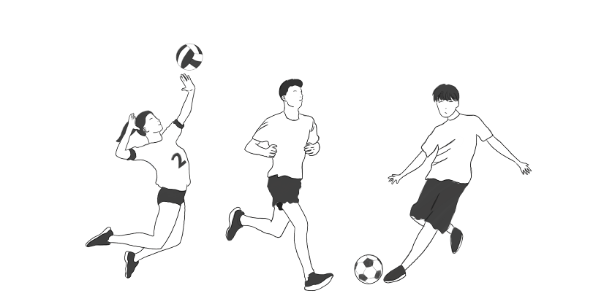Many high school student-athletes dream about signing day. Yet college recruitment is often romanticized as this hat-choosing, “I’m taking my talents to…”, announcing event that athletes prepare for by practicing their NCAA-worthy signatures and candid smiles — at least, that is the impression I got growing up watching sports movies and idolizing five-star recruits. But for most student-athletes, it is a rollercoaster journey that can end with results on either end of the spectrum, even making you question your own self-worth in the process.
Some student-athletes in the class of 2021 have chosen to take this route with the hopes of pursuing our passions at the collegiate level, but with the reality of the relatively low shot we have at top-tier athletic schools, is it even worth it?
There are many reasons for wanting to play sports in college, but the level of commitment required means that athletes must really love the sport. I cannot imagine my life without basketball, which I started playing when I was four, but I was still uncertain on whether I wanted the sport to consume every waking moment of free time I had. I was also not planning to continue playing after college; for others, however, this can be another source of motivation to play in college as a first step towards a future career.
“I want to fence in college because it’s something I started at a really young age,” Michael W. (‘21) said. “Competing at the college level would also get me one step closer to my ultimate goal of representing Chinese Taipei in the Olympics.”
Another source of motivation can be a potentially easier route to one’s dream school. For selective colleges especially, students that enter the athlete pool have the support of the coaches and thus do not need to reach as high of an academic standard. However, for athletes looking to play for a more academically competitive school, it is much more difficult to gain initial interest from coaches.
The recruiting process involves many intricate steps, which were made even more difficult this year because of the COVID-19 coronavirus that has made in-person campus visits impossible. This made frequent emailing and reaching out online even more important. It was really challenging because you have to constantly update coaches with statistics and footage, even if they do not respond the first, or even the second, time.
Student-athletes are also able to learn crucial interviewing and social skills through phone calls and Zoom or Skype calls with coaches and current athletes on their potential team. “Talking to coaches was scary at first, but it became much easier once I realized that they are just normal people like me,” Sarah J. (‘21) said.
It is also important to learn how to control your feelings throughout the ups and downs of the process. Coaches have a limited amount of space on their roster, so students should not take it personally if they do not reciprocate interest. I will be the first to admit that it stings when you get that first “unfortunately we have already filled our roster” email, but I do believe it has strengthened my mindset.
Ultimately, student-athletes should find a school that is the best fit for them, a school that they would be excited to attend for all aspects, not just sports. Just like how schools are looking for a holistic student, students should also be looking for a holistic college experience. Personally, I was very selective with the schools I talked to because being able to play sports was just one part of the criteria I considered.
Do not be afraid to reach out to schools that seem “too good,” as the college recruiting process is extremely subjective. “Go in with the mentality that you have nothing to lose. There are thousands of other athletes competing for the same spot, but you never know what the coaches want until they’ve seen what you can bring to the table,” Michael said.

![[SABRINA CHANG/THE BLUE & GOLD]](https://blueandgoldonline.org/wp-content/uploads/2021/01/sportsbanner-900x342.png)
![The TAS varsity rugby team plays a game against a local team. [PHOTO COURTESY OF TAS ATHLETICS]](https://blueandgoldonline.org/wp-content/uploads/2025/01/VarsityRugby_Action-1068-1200x800.jpeg)
![[PHOTO COURTESY OF SAMANTHA L. (‘27) & TAS ATHLETICS]](https://blueandgoldonline.org/wp-content/uploads/2024/12/Untitled-design-1200x624.jpeg)
![The TAS girl’s volleyball team celebrate with streamers and a human tunnel after winning the gold medal. [CHESTER DENNIS/THE BLUE & GOLD]](https://blueandgoldonline.org/wp-content/uploads/2025/01/DSC05732-1200x800.jpeg)
![Irish Potato brought in friers and potatoes for students to enjoy between games. (ABBY
CHANG/THE BLUE & GOLD.]](https://blueandgoldonline.org/wp-content/uploads/2025/01/IMG_0350-1200x900.jpeg)
![Sean L. ('25) plays soccer on the Varsity soccer team at TAS. [PHOTO COURTESY OF SEAN L.]](https://blueandgoldonline.org/wp-content/uploads/2022/12/IMG_4010-900x600.jpeg)
